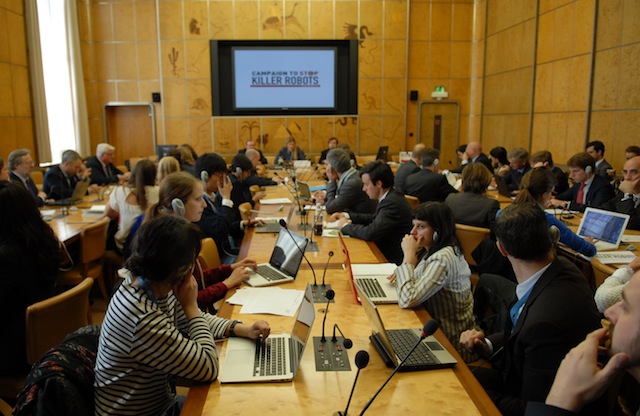
Consensus: killer robots must be addressed

On 30 May 2013 in Geneva, nations for the first time ever debated what to do about fully autonomous weapons at the United Nations Human Rights Council following the presentation of the report on ‘lethal autonomous robotic weapons’ by the UN Special Rapporteur on extrajudicial, summary or arbitrary executions for the Office of the High Commissioner for Human Rights, Professor Christof Heyns.
During the “interactive dialogue,” 20 nations spoke for up to three minutes each on the report’s findings on fully autonomous weapons: Algeria, Argentina (GRULAC), Austria, Brazil, China, Cuba, Egypt, France, Germany, Indonesia, Iran, Mexico, Morocco, Pakistan, Russia, Sierra Leone, Sweden, Switzerland, UK, and US. There were also statements by the European Union (comprised of 27 states) and Pakistan on behalf of the Organization of the Islamic Conference (56 states).
All these nations expressed interest and concern in the challenges posed by fully autonomous weapons. None opposed discussing the issue further. Pakistan expressed its support for a ban, while others endorsed the report’s call for a moratorium. The United Kingdom was the only state to declare its opposition to the call for a moratorium or a ban on fully autonomous weapons. Brazil and France suggested the Convention on Conventional Weapons as a venue for discussing the topic further.
Sweden explained that it is traditionally responsible for the resolution on the work of the UN Special Rapporteur on extrajudicial, summary or arbitrary executions. It said the resolution will be put forward in 2014 at the 26th session of the Human Rights Council (this is currently the 23rd session). Sweden indicated that the resolution will include operative paragraphs on the recommendations contained in the report.
The United Nations disarmament chief Angela Kane provided a statement delivered by Jarmo Sareva that noted, “[t]he emergence of autonomous weapons calls into question the adequacy of measures to implement the rules of armed conflict that apply to the use of all weapon systems. The purpose of these rules is clear. The major imperative is to protect civilians from unacceptable harm. There must also be adequate human accountability at all times. Yet, one key question posed by autonomous weapons is how can accountability be maintained when humans are no longer involved in the final decision?”
In its statement during the NGO session–its first ever statement in a multilateral fora–the Campaign to Stop Killer Robots welcomed the UN Special Rapporteur and urged all to states endorse and implement its recommendations, including the call for an immediate moratorium on robotics weapons systems that, once activated, can select and engage targets without further intervention by a human. This would be a first step towards a comprehensive international ban on these fully autonomous weapons.
The Campaign to Stop Killer Robots statement was delivered by Beatrice Fihn of the Women’s International League for Peace and Freedom. The campaign said that it shares the moral, ethical, legal, policy, technical, and other concerns that the UN report raises with respect to these weapons. To avoid future harm it is urging states to take action now to stop the creation of weapons that would choose and fire on targets on their own without meaningful human supervision or control. As the UN report warns, “If left too long to its own devices, the matter will, quite literally, be taken out of human hands.”
On Tuesday, 28 May 2013, Steve Goose from Human Rights Watch and Peter Asaro from the International Committee on Robot Arms Control explained the campaign’s objectives and its views on the UN report during a press conference and side event.
Representatives from 25 nations attended the Human Rights Council side event held by the campaign on Tuesday, May 28: Australia, Canada, Denmark, Finland, France, Germany, Greece, Guatemala, Holy See, Ireland, Italy, Japan, Netherlands, New Zealand, Norway, Pakistan, Russia, South Africa, Sweden, Switzerland, UK, US, and Zimbabwe, in addition to the European Union and civil society representatives, including campaign Steering Committee members Article 36, IKV Pax Christi, and Mines Action Canada.
Before the side event, the Association of UN Correspondents/Association des Correspondents Auprès des Nations Unies (ACANU) hosted a press briefing by the campaign that 20 UN Geneva-based journalists attended. The campaign issued a press release and synopsis of the UN report.
The Campaign to Stop Killer Robots was launched in London on 23 April 2013. The international coalition is led by a Steering Committee of nine non-governmental organizations and has campaign representatives in 15 countries.
For more information, please see:
- Campaign Report on Outreach on ‘lethal autonomous robotics’ (31 July 2013)
UN Report on ‘lethal autonomous robotic weapons’ (April 2013) - Video of country statements divided into 9th meeting and 10th meeting (30 May 2013)
- Campaign Statement to Human Rights Council (30 May 2013)
- Campaign Update on the UN report (30 April 2013)
- Campaign Press Release – UN Report (28 May 2013)
- Article 36 (UK) Press Statement (30 May 2013)
- Human Rights Watch (US) Press Statement (28 May 2013)
- IKV Pax Christi (Netherlands) Press Statement (28 May 2013)
- Synposis of UN Report (21 May 2013)
- Photographs


